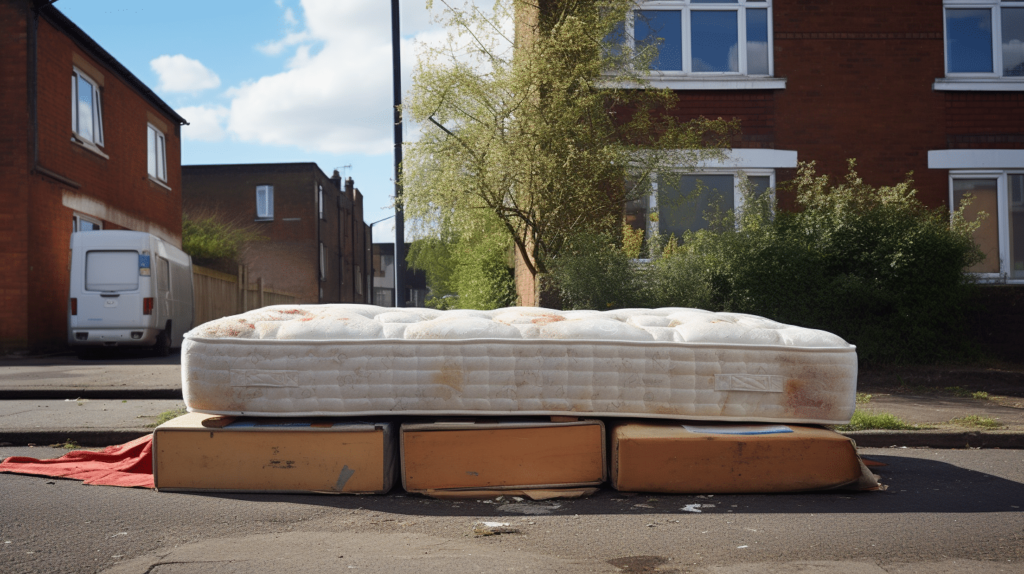Disposing of an old mattress in British Columbia, Canada, is a practical necessity when it’s time to replace your trusted sleep companion.
However, navigating the costs associated with mattress disposal in this province can be a bit like navigating a dreamy fog – unclear and often surprising. Whether you’re a resident looking to rid yourself of a worn-out mattress or a business owner seeking to manage the disposal of multiple mattresses, understanding the various factors that influence the cost is essential.
In this guide, we’ll shed light on the intricacies of mattress disposal costs in BC, helping you make informed decisions while ensuring a cleaner and more comfortable night’s sleep for all. Let’s delve into the realm of mattress disposal expenses in the picturesque province of British Columbia.

Introduction
Disposing of a mattress may seem like a straightforward task, but in reality, it involves various considerations. From recycling to landfill fees, there are several factors that can impact the cost and environmental impact of mattress disposal. In this guide, we will explore all the aspects of disposing of a mattress in BC, Canada, to help you make an informed decision.
Understanding the Costs
- Landfill Fees Disposing of a mattress at a landfill in BC typically incurs a fee. These fees can vary depending on your location within the province. On average, you can expect to pay anywhere from $40 to $50 for each mattress.
- Recycling Fees BC has a strong commitment to recycling, and this includes mattresses. Recycling centers may charge a fee for accepting your old mattress, but the cost is often lower than landfill fees.
- Pick-Up Services If you prefer the convenience of having your mattress picked up from your location, several companies offer this service in BC. Prices range from $100 to $200, depending on the provider and your location.
- Eco-Friendly Options BC is known for its environmental initiatives. Some recycling centers and organizations offer free or subsidized mattress recycling programs to promote eco-friendly disposal methods.
The Recycling Process
When you opt for mattress recycling, you’re contributing to the reduction of waste in landfills and the conservation of valuable resources. Recycling centers in BC follow these steps:
- Collection of Mattresses
- Dismantling and Separation of Materials
- Recycling of Metal, Foam, and Fabrics
- Proper Disposal of Non-Recyclable Components
Regulations and Environmental Impact
- Environmental Regulations BC has strict regulations in place to ensure proper mattress disposal. Illegally dumping mattresses can result in fines. Always follow the guidelines set by your local municipality.
- Reducing Environmental Impact Consider donating your mattress if it’s still in good condition. This not only helps others in need but also reduces waste.
Frequently Asked Questions (FAQs)
1. Can I leave my old mattress by the curb for pick-up? Some municipalities offer curbside pick-up services for old mattresses, but it’s essential to check with your local government for specific guidelines.
2. Are there any free mattress disposal options in BC? Yes, some organizations and recycling centers offer free or low-cost mattress disposal options to promote recycling.
3. Is mattress recycling really eco-friendly? Absolutely. Recycling mattresses reduces waste in landfills and conserves resources.
4. Can I dispose of a mattress in a dumpster? Dumpsters are not designed for mattress disposal, and it’s usually against regulations. Properly dispose of your mattress at a recycling center or landfill.
5. What happens to the materials from recycled mattresses? Materials like metal, foam, and fabrics are separated and recycled, while non-recyclable components are disposed of responsibly.
6. Can I donate my old mattress? Donating your mattress is a great way to help those in need and reduce waste. Many charities accept gently used mattresses.
Conclusion
Disposing of a mattress in BC, Canada, doesn’t have to be a daunting task. By understanding the costs, recycling options, and environmental impact, you can make a responsible choice that benefits both your wallet and the planet. Remember to follow local regulations and explore eco-friendly disposal methods to contribute to a greener future.

